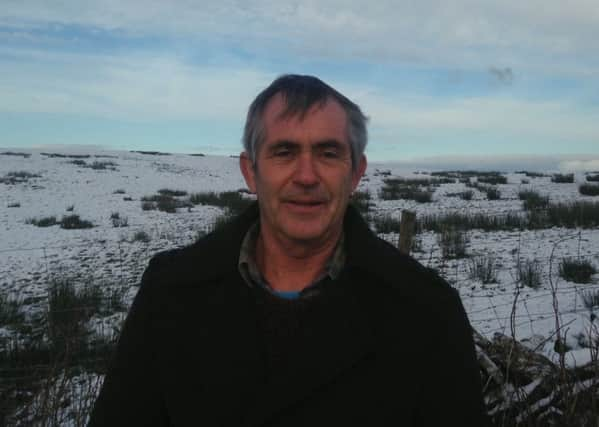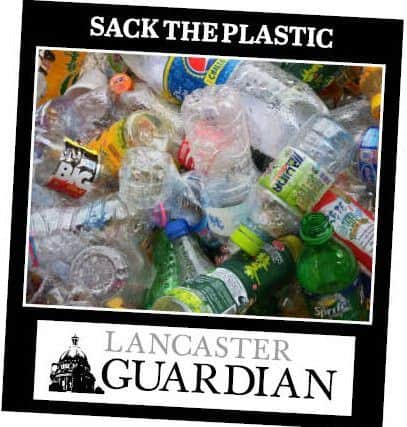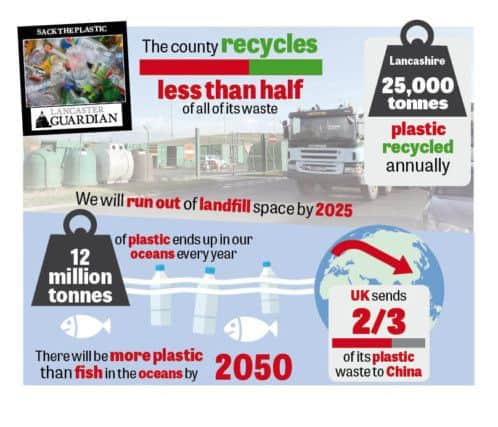Lancaster's Mayor Elect - '˜think globally, act locally' on plastics


“I guess it started for me when I was looking to refill my drinking bottle in the town centre one warm summer’s day (yes – we did have some!)
“There were no drinking fountains, and I didn’t want to buy a coffee.
Advertisement
Hide AdAdvertisement
Hide Ad“Yet I could easily buy another six plastic water bottles for just a pound nearby.


“So a lot of us chuck the plastic bottle and hope it gets recycled (in fact only six per cent are currently).
“If I’d bought a take away coffee, the cups are not recyclable at all, because the cardboard has a plastic lining.
“I began to work up a project, involving installing water fountains, replacing single use bottles and coffee cups.
“To buy a re-usable drinks bottle is only £2.50.


Advertisement
Hide AdAdvertisement
Hide Ad“Once you start inevitably I became aware of my own use of other plastic – and there’s plastic packaging round, well, everything.
“There are alternatives – I remember we used to buy our vegetables from greengrocers in paper bags, our milk in glass bottles.
“Now most of my regular shopping from the local supermarket comes wrapped in plastic.
“So what difference can a small city like Lancaster make in the scheme of things?


Advertisement
Hide AdAdvertisement
Hide Ad“Doing some research online, I soon found other groups, such as Greenpeace, and other communities, as well as media were starting to act – and I hope other cities will join in.
“Finally at the city council meeting I asked, ‘What will we do when we’ve trashed this planet? Start another? Maybe trash that too?’
“It’s time to end our addiction to plastic, and to use a phrase – think globally and act locally.”
Waste removal company JUNK HUNTERS have offered some practical tips to reduce home waste:


Advertisement
Hide AdAdvertisement
Hide AdChoosing products with minimal packaging – shop wisely and choose foods with little or no packaging such as fruits and vegetables. Buy things in bulk to save buying singularly packaged smaller versions of the same products e.g. cleaning products, toilet paper, cereal etc.
Buy reusable containers – they are a lifesaver when it comes to food, keeping cereals, rice and pasta stored properly to extend life and prevent waste. You can also use them to bring food from home daily to avoid buying packaged takeaway sandwiches.
Invest in reusable items – items such as large reusable shopping bags can be kept in the boot of the car and used when needed to avoid having tonnes of plastic disposable ones being thrown away. Rechargeable batteries are also a great investment as you can simply charge them up and reuse them to save buying new ones each time with more packaging to discard.
Stop buying plastic water bottles – plastic water bottles are a huge waste material, purchasing a large reusable water bottle or flask is a much eco-friendlier choice and you can keep refilling it throughout the day to stay hydrated.
Advertisement
Hide AdAdvertisement
Hide AdMeal planning – planning ahead is so easy and quick to do it and it will save so much food going to waste in the long run. Plan breakfast, lunch and dinner weekly and buy everything in advance so you’ll have exactly what you need and no more.
Start composting – composting is a great way to reduce food waste going to landfill which does not break down as easily causing harmful gases like methane in the atmosphere. When composted in the garden, waste can break down properly as it remains above ground with access to fresh air - within a year you have natural fertiliser to use for your garden and plants.
Repurpose materials – think twice before throwing things away, lots of things around the house can be repurposed. Envelopes make great scrap paper and cardboard; old newspaper and egg boxes can be donated to local schools for arts and crafts materials.